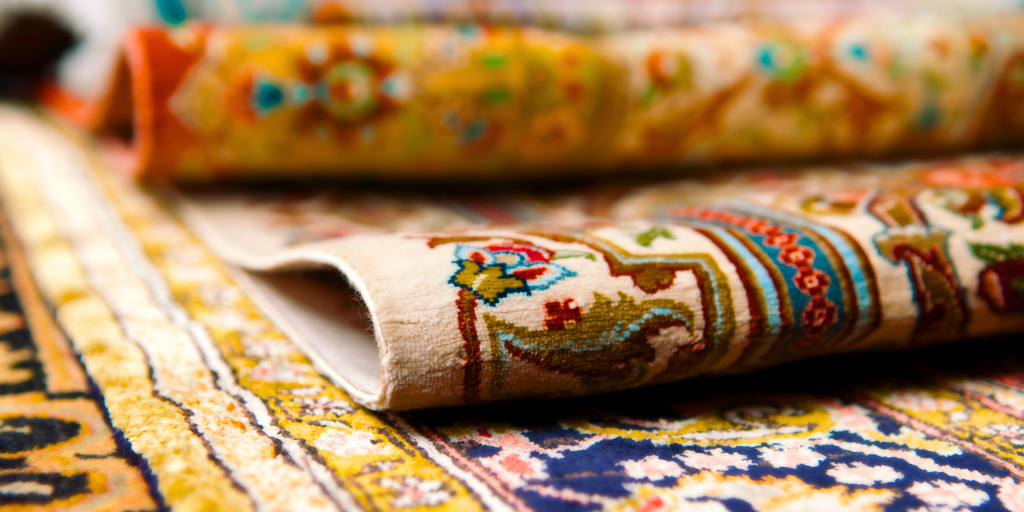
A tradition of intentional, humble imperfection inspired Flávia Ghelardi to consider the ways we exercise our humility.
Flávia Ghelardi writes from Brazil in English and Portuguese. Vá para a versão em português.
The Persian carpet is considered one of the most beautiful in the world and has been made since 500 years before Christ. There is a story about these carpets that says that the craftsman always leaves a stitch done wrong, the so-called “Persian stitch,” to remind us that only God is perfect.
I found this story very interesting, because it's a way of exercising our humility. The craftsman, even on purpose, doesn't leave his work perfect, so as not to be proud. This lesson should be kept in mind especially in our fight against our sins, defects and imperfections, since, while we live in this world, we can always fail.
Recognizing our imperfection
How difficult it is to recognize that we've made the same mistake, the one we've made so many times and regretted so many times! We can be tempted to despair, to think that it's impossible to improve, to be holy ... but that's not what God the Father expects of us. Saint Paul asked God countless times to remove a “thorn" from his flesh, and what was the Father's response?
“My grace is sufficient for you, for power is made perfect in weakness.” (2 Corinthians 12:9)
He especially wants us to trust in His infinite mercy and, above all, to humbly ask for His help. Saint Paul continues to teach us:
“Therefore, I am content with weaknesses, insults, hardships, persecutions, and constraints, for the sake of Christ; for when I am weak, then I am strong.” (2 Corinthians 12:10)
It is in our weakness, in our smallness, that God can reveal His wonders. When we give ourselves, like a child, into the Father's arms, knowing that without Him we are nothing, then He melts with love for us and performs the miracle of our sanctification in us.
Of course, we need to do our part, to make an effort every day to overcome our weaknesses and limitations, preferably in a very concrete way, by choosing a mortification or penance to overcome what we know does not please the Father. But above all, we need to ask the Father to help us in this struggle. Ask with humility and insistence.

What can we learn from Scriptures?
The parable of the widow and the unjust judge teaches us that we must always ask God insistently to help us in all our needs.
“Will not God then secure the rights of his chosen ones who call out to him day and night? Will he be slow to answer them?” (Luke 18:7)
Jesus insists on the need to ask:
“Ask and it will be given to you; seek and you will find; knock and the door will be opened to you. For everyone who asks, receives; and the one who seeks, finds; and to the one who knocks, the door will be opened.” (Matthew 7:7-8)
And again:
"Whatever you ask for in prayer with faith, you will receive.” (Matthew 21:22)
So let's continue confidently on this path that leads to Heaven. Struggling and asking, without discouragement, but with confidence. If we haven't managed to make much progress yet, or if we slip up and end up back where we started, it doesn't matter. The key is to always start again. With humility and perseverance. The Father has the greatest interest in our sanctification, so we don't need to worry.
We know that all things work for good for those who love God. (Romans 8:28)

O Ponto Persa
O tapete persa é considerado um dos mais belos do mundo e é confeccionado desde 500 anos antes de Cristo. Há uma história sobre esses tapetes que diz que o artesão sempre deixa um ponto feito de maneira errada, o chamado “ponto persa”, para lembrar que perfeito, só Deus.
Achei muito interessante essa história, pois é uma forma de exercitar nossa humildade. O artesão, mesmo propositadamente, não deixa seu trabalho perfeito, para não ficar orgulhoso. Essa lição devemos ter em mente especialmente em nossa luta contra nossos pecados, defeitos e imperfeições, já que, enquanto vivemos nesse mundo, sempre poderemos falhar.
Como é difícil reconhecer que caímos no mesmo erro, aquele que já caímos tantas vezes e nos arrependemos outras tantas! Podemos ter a tentação do desespero, de achar que é impossível melhorar, ser santo... Mas não é isso que Deus Pai espera de nós. São Paulo pediu inúmeras vezes a Deus que lhe tirasse um “espinho da carne”, e qual foi a resposta do Pai?
“Basta-te minha graça, porque é na fraqueza que se revela totalmente a minha força”. (2 Cor 12,9)
Ele deseja especialmente a nossa confiança em sua infinita misericórdia e principalmente que peçamos humildemente a sua ajuda. São Paulo continua nos ensinando: “Eis por que sinto alegria nas fraquezas, nas afrontas, nas necessidades, nas perseguições, no profundo desgosto sofrido por amor de Cristo. Porque, quando me sinto fraco, então é que sou forte”. (2 Cor 12,10)
É em nossa fraqueza, em nossa pequenez, que Deus pode revelar suas maravilhas. Quando nos entregamos, como uma criança, nos braços do Pai, sabendo que sem ele nada somos, aí então Ele se derrete de amor por nós e realiza em nós o milagre da nossa santificação.
Claro que precisamos fazer a nossa parte, nos esforçar a cada dia por vencer em nós as fraquezas e limitações, de preferência de um modo bem concreto, escolhendo uma mortificação ou penitência para vencer aquilo que sabemos não agrada ao Pai. Mas principalmente precisamos pedir ao Pai que nos ajude nessa luta. Pedir com humildade e com insistência.
A parábola da viúva e do juiz injusto nos ensina que devemos pedir sempre, insistentemente, para que Deus nos ajude em todas as nossas necessidades. “Por acaso não fará Deus justiça aos seus escolhidos, que estão clamando por ele dia e noite? Porventura tardará em socorrê-los?” (Lc 18,7). Jesus insiste na necessidade de pedirmos: “Pedi e se vos dará. Buscai e achareis. Batei e vos será aberto. Porque todo aquele que pede, recebe. Quem busca, acha. A quem bate, se abrirá.” (Mt 7,7-8) E ainda: “Tudo o que pedirdes com fé na oração, vós o alcançareis” (Mt 21,22)
Assim, vamos seguir confiantes nesse caminho que nos leva ao Céu. Lutando e pedindo, sem desânimo, mas com confiança. Se ainda não conseguimos avançar muito, ou se escorregamos e acabamos voltando aonde começamos, isso não importa. O fundamental é recomeçar sempre. Com humildade e perseverança. O Pai é o maior interessado em nossa santificação, então não precisamos nos preocupar. Tudo concorre para o bem dos que amam a Deus! (Rom 8,28)

Share your thoughts with the Catholic Mom community! You'll find the comment box below the author's bio and list of recommended articles.
Copyright 2024 Flávia Ghelardi
Images: Canva
About the Author

Flávia Ghelardi
Flávia Ghelardi is the mom of four, a former lawyer already "promoted" to full time mom. Flávia published her first book FORTALECENDO SUA FAMÍLIA and is a member of Schoenstatt´s Apostolic Movement. Flávia loves to speak about motherhood and the important role of women, as desired by God, for our society. She blogs at www.fortalecendosuafamilia.blogspot.com.


.png?width=1806&height=731&name=CatholicMom_hcfm_logo1_pos_871c_2728c%20(002).png)
Comments